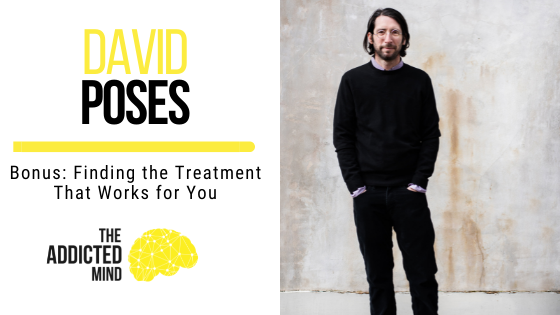The stigma of addiction is so bad that people who are struggling with it choose to hide it. However, addiction is not the real problem, but rather the symptom of all these underlying hurts, pains, and suffering.
Today’s episode is a replay of an interview with David Poses, who recently passed away, in honor of his life and legacy. A writer, speaker, and activist, David was a tireless advocate for all who struggled with mental health or addiction issues. David is the author of The Weight of Air: A Story About the Lies of Addiction and the Truth of Recovery.
David struggled with addiction, which he chose to hide for a long time. After trying to find a treatment that worked for him, he soon discovered buprenorphine, an opioid used to treat opioid-use disorders, which also saved his life from heroin. David also realized that being sober only means abstaining from whatever it is you’re addicted to, while recovery happens only when you’ve healed the wounds that led you to addiction in the first place.
That being said, there are different ways to treat addiction, and so, ultimately, you have to find one that works for you.
In this episode, you will hear:
- Resorting to heroin due to depression but it was also heroin that caused his depression
- Why AA wasn’t the right solution for him
- Finding the treatment and recovery method that works for us
- How opioids affect the brain
- Two medications that have been proven to dramatically reduce your risk of death, relapse, and overdose
- How buprenorphine saved David’s life
- Achieving recovery through healing the wounds that led you to addiction
- The stigma of addiction
Key Quotes:
[13:58] – “For every kind of vice or addiction, your neurotransmitters rewire, and they seek out the next hit. There’s the idea that sobriety gets easier with time and your brain heals in time and things go back to normal… But there have been a lot of studies about opioids that show that it doesn’t necessarily go back.”
[21:12] – “There are two medications that are proven to dramatically reduce your risk of death, relapse, and overdose: methadone and buprenorphine. All other forms of treatment or medications do not, and many others actually do the exact opposite.”
[21:31] – “Any kind of abstinence-based treatment, whether it’s forced or voluntary, increases your risk of overdose because you come out of it, you have no tolerance, and that’s when people die.”
[23:10] – “Addiction has been so siloed off away from medicine for so long. Even with doctors, I tell the doctor the history and they assume I’m in there looking for drugs.”
[35:03] – “If sobriety is I’m not taking drugs anymore or abstinence. Recovery is healing the wounds that led you to drugs in the first place.”
[39:09] – “The stigma of addiction is so bad that I was seriously contemplating suicide.”
[41:02] – “Addiction is not the problem. Addiction is definitely a problem but drugs are a form of self-medication.”
[47:12] – “With any physical or psychological thing, we identify the source of pain, and we treat it so you can heal. With addiction, we explicitly tell you to ignore the source of pain because it’s an excuse.”
Subscribe and Review
Have you subscribed to our podcast? We’d love for you to subscribe if you haven’t yet.
We’d love it even more if you could drop a review or 5-star rating over on Apple Podcasts. Simply select “Ratings and Reviews” and “Write a Review” then a quick line with your favorite part of the episode. It only takes a second and it helps spread the word about the podcast.
If you really enjoyed this episode, we’ve created a PDF that has all of the key information for you from the episode. Just fill in your information below to download it.
Supporting Resources:
GoFundMe campaign to support David Poses’ family
The Weight of Air: A Story About the Lies of Addiction and the Truth of Recovery

